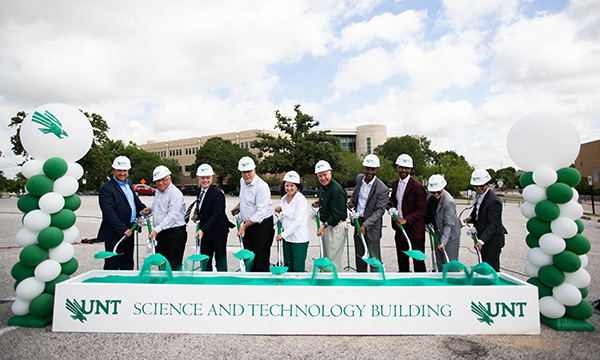|
|
|
|
|
|
 |
|
Groundbreaking for New Research Building
To support its historic growth as a Carnegie-ranked Tier One public research university, UNT is constructing a 111,000-square-foot, multidisciplinary research building on its Denton campus. The UNT Science and Technology Building will fulfill a critical need for more modern facilities that support collaborative and interdisciplinary research while creating experiential learning opportunities for students. The project is possible thanks to $103.4 million in tuition revenue bonds authorized by the 87th Texas Legislature in 2021. "To solve really challenging questions that society faces or to develop new technologies, it takes people from different areas and different fields," said UNT vice president of research and innovation Pamela Padilla at the groundbreaking ceremony. "If you put them together in the same building in the same space, which universities are set up to be able to do, you are more likely to have much more creativity come out and more projects that wouldn't have been envisioned otherwise."
|
|
|
|
|
|
|
|
 Workforce of the Future Workforce of the Future
UNT faculty and staff are leading programs to develop a more competitive Texas workforce. State and federal government agencies have contributed deep investments into these initiatives, which will match more individuals with meaningful careers while helping to solve problems in a changing global society. For example, the UNT Workplace Inclusion and Sustainable Employment program in the College of Health and Public Service received a $12.7 million U.S. Department of Education Rehabilitation Services Administration grant that will help improve quality of life for people with disabilities in Texas. With a $3.8 million U.S. Department of Education grant, UNT's College of Education is expanding mental health care and training in local Title I schools in Denton and Lewisville ISDs. Other initiatives are engaging students early in the STEM disciplines and helping create better career pathways for emerging fields like fusion power.
|
|
|
|
|
|
| Recycling Wind Turbines |
|
Sheldon Shi, professor of mechanical engineering, is investigating a potential option for repurposing the growing number of end-of-life wind turbine blades in the U.S. The proposed method would grind composite blades down to particles that would be blended with wood particles to make hybrid particleboard products. The research project was one of 20 selected for phase one funding by the U.S. Department of Energy (DOE) Wind Energy Technologies Office in its Wind Turbine Materials Recycling Prize competition. Later this year, the DOE will announce up to six winners to award more funding to further advance their research.
|
|
|
|
|
|
|
| Sodium Toxicity |
|
Professor Constance Hilliard, an African evolutionary historian, found that certain illnesses common in many Black American communities — like hypertension and kidney disease — may be explained by unique genetic variations that affect how the body absorbs sodium. Hilliard's research is detailed in her book Ancestral Genomics: African American Health in the Age of Precision Medicine, in which she also mentions how another genetic variant can explain Black Americans' unusually high susceptibility to a certain class of aggressive cancers like triple-negative breast cancer. "As a historian, I'm making connections between past ecological environments' impact on people then and their ancestors today," Hilliard says.
|
|
|
|
|
|
|
| Creative Research |
|
UNT faculty Philip Dizack (jazz trumpet), Molly Fillmore (vocal studies) and Eugene Martin (media arts) have been named 2024-25 Institute for the Advancement of the Arts Faculty Fellows. Over the next year, they'll be deepening their scholarship and enhancing their teaching through creative research projects exploring themes such as storytelling in pursuit of connection, change and cultural preservation. UNT launched the IAA in 2009 to support and advance excellence in the visual, performing, creative and literary arts.
|
|
|
|
|
|
|
| AI and Food Choices |
|
In the latest installment of The Lab, registered dietitian and associate professor Priscilla Connors in the College of Merchandising, Hospitality and Tourism describes how her students use ChatGPT to learn more about nutrition and making healthy eating choices — while also learning the importance of fact-checking. Connors leads studies on campus tied to UNT's involvement in the Menus of Change research collaborative as well. Catch up on other episodes of The Lab by subscribing to the UNT YouTube Channel.
|
|
|
|
|
|
|